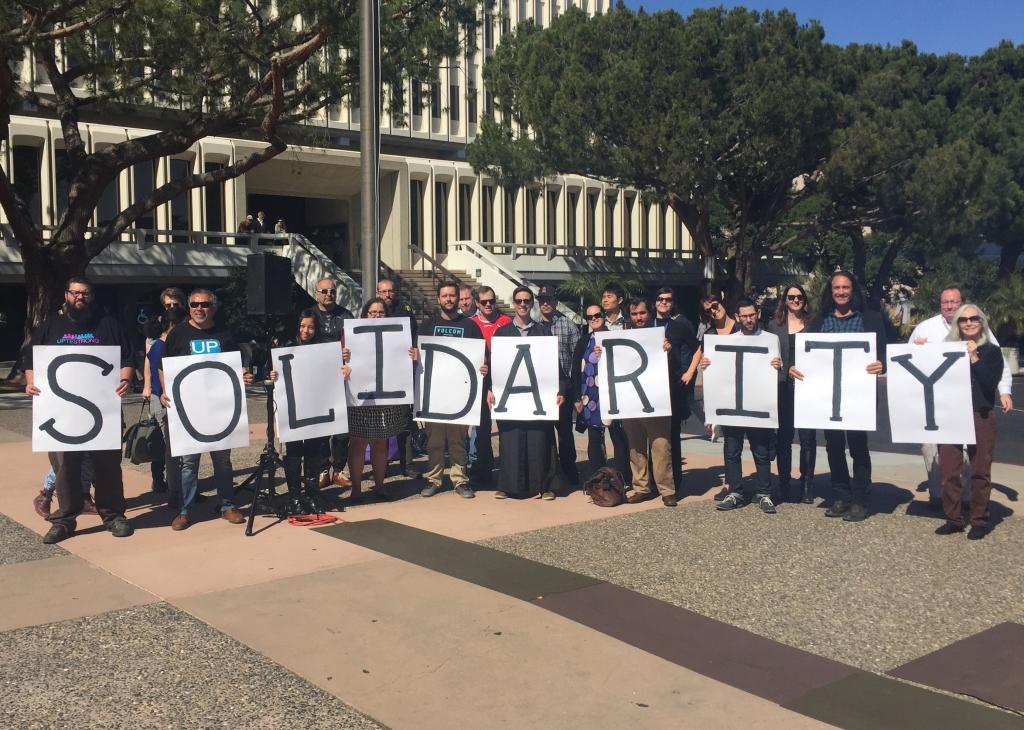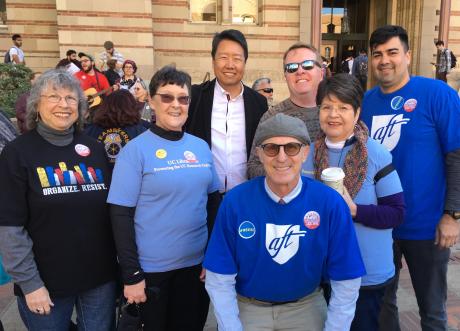Janus v. AFSCME: A Threat to Our Public Institutions
By: Mia L. McIver, President, UC-AFT
On February 26th, the Supreme Court heard oral arguments in Janus v. AFSCME. The case, brought by an Illinois state employee who objects to paying for services he receives from his labor union, will likely result in defeat for working-class and middle-class Americans. At stake is not only the ability of public sector employees to fully exercise our collective bargaining rights, but also the quality of public higher education systems across the nation, and therefore the future of our democracy.
 Plaintiff Mark Janus says he doesn’t want to support the costs of his union’s bargaining and representation. He would rather benefit from his union’s work without paying the fair share fees that enable it. If the Supreme Court decides as expected, the law will sanction union-represented non-members to behave like the barnyard animals in the tale of the Little Red Hen: they won’t pitch in to make the bread but will still come running eagerly to eat it.
Plaintiff Mark Janus says he doesn’t want to support the costs of his union’s bargaining and representation. He would rather benefit from his union’s work without paying the fair share fees that enable it. If the Supreme Court decides as expected, the law will sanction union-represented non-members to behave like the barnyard animals in the tale of the Little Red Hen: they won’t pitch in to make the bread but will still come running eagerly to eat it.
Even children know this is wrong. But the right-wing extremists behind Janus want to kill our unions by introducing a free rider problem. They want to maintain the law that requires unions to bargain for members and non-members alike while simultaneously starving unions of resources.
They argue that, if money equals speech (see Citizens United), compelling non-union members to pay fair share fees violates their First Amendment rights. First Amendment defenders assure us that this is not the case because, when the government acts as an employer, it necessarily imposes all kinds of permitted restrictions on speech (the ACLU), and we are often compelled to subsidize speech we don’t personally agree with through taxes and other mechanisms (libertarian scholars Eugene Volokh and William Baude).
There’s another argument to be made that fair share fees don’t abridge free speech rights. The Court was persuaded by this argument when it decided Abood v. Detroit Board of Education, the 1977 case—and settled law—that the Court’s conservative wing will likely overturn. Janus contends that his union doesn’t speak for him or take bargaining positions he agrees with. But the First Amendment in no way guarantees that one’s free expression will win an argument or carry a debate.
Janus is perfectly free to talk all he wants, as loudly as he wants, about his union’s activities. He has the choice to voice his objections at membership meetings and union conventions. He has the option of running for elected office and steering the direction of his union. He’s not deprived of his First Amendment rights; he simply refuses to exercise them.
Janus is a right-wing effort to overturn 40 years of consensus governing thousands of collective bargaining agreements. Up until now, federal law and state laws across the country have recognized that a worker’s free speech isn’t violated just because her particular view on raises or healthcare hasn’t yet won majority support in her union’s democratic processes. If Janus believes a raise is bad public policy, he should say so. But the First Amendment doesn’t guarantee that anyone will be persuaded by his argument—and it doesn’t give him license to foist the cost of negotiating his raise onto his co-workers.
Janus seeks to deal a double blow: to public sector unions, and then to the public school, college, and university students who are educated by unionized teachers. Janus has to be understood especially as an attack on teachers and students because more than 40% of public sector union members belong to education unions. At the University of California alone, 77,000 union-represented workers preserve and promote the research, teaching, and service mission of the UC. Our work directly and indirectly prepares students to fully participate in our democracy. By educating California’s students, we serve as the guardians of our future civic life. No wonder we’re such a threat to the oligarchs.
All Californians should care about Janus because it has the potential to decrease the accountability of our state and local agencies, especially the University of California. Our union represents about 5000 contingent faculty and librarians on all UC campuses. We fight for the UC budget to directly fund education, not line the pockets of administrators.
Although UC lecturers teach one-third of undergraduate credit hours, many lecturer faculty are hired as temps with low wages, no benefits, and few prospects of being reappointed after their short-term contracts expire. Lecturer faculty are extraordinarily talented and dedicated scholar-teachers, and our students deserve to learn from instructors who aren’t consumed with figuring out where their next paycheck is going to come from.
When we negotiate our contract, we sit across the bargaining table from the UC’s army of labor relations lawyers, who earn enormous salaries to reject our proposals for funding classroom instruction. Janus threatens to put us at an even greater disadvantage as we advocate for our students’ learning conditions and for the careful stewarding of taxpayer money toward teaching and away from wasteful bureaucracy.
If we as Californians care about the UC, if we care that our young people receive an education that prepares them for democratic rights and privileges, then we should be deeply alarmed that the Supreme Court is set to decimate public sector unions. It’s yet another attack on our democratic institutions by a tiny cadre of extremely wealthy people seeking to exclude everyone else.
Further Reading
Janus Basics:
A Supreme Court showdown could shrink unions' power
Supreme Court's conservatives appear set to strike down union fees on free-speech grounds
The future of America’s unions hangs in the balance
The Official Record:
SCOTUSBlog documents and analysis
Economic Effects on Women, Workers of Color, and America's Middle Class:
Why women should care about the Janus v. AFSCME Supreme Court case
What the latest union case before the Supreme Court could mean for workers of color
Unions helped integrate America. The Supreme Court could end that this year
Supreme Court Janus case is bigger than unions. Upward mobility is at stake
How a union raises your wage--even if you're not a member
Janus v. AFSCME is a threat to all workers
Funders and Backers:
Fears grow as rightwing billionaires battle to erode US union rights
Behind Janus: Documents reveal decades-long plot to kill public-sector unions
First Amendment Claims:
The bogus "Free Speech" argument against unions
Public sector union fees don't violate the First Amendment
Newspaper Editorials:
A bogus free-speech argument at the Supreme Court is union-busting in the name of the 1st Amendment
Don't gut public sector unions, Supreme Court. They're California's middle class
What's Next:
How defunding public sector unions will diminish our democracy
Organized labor is in a life or death struggle. Be very scared.
West Virginia teachers are showing how unions can win power even if they lose Janus

- Log in to post comments

